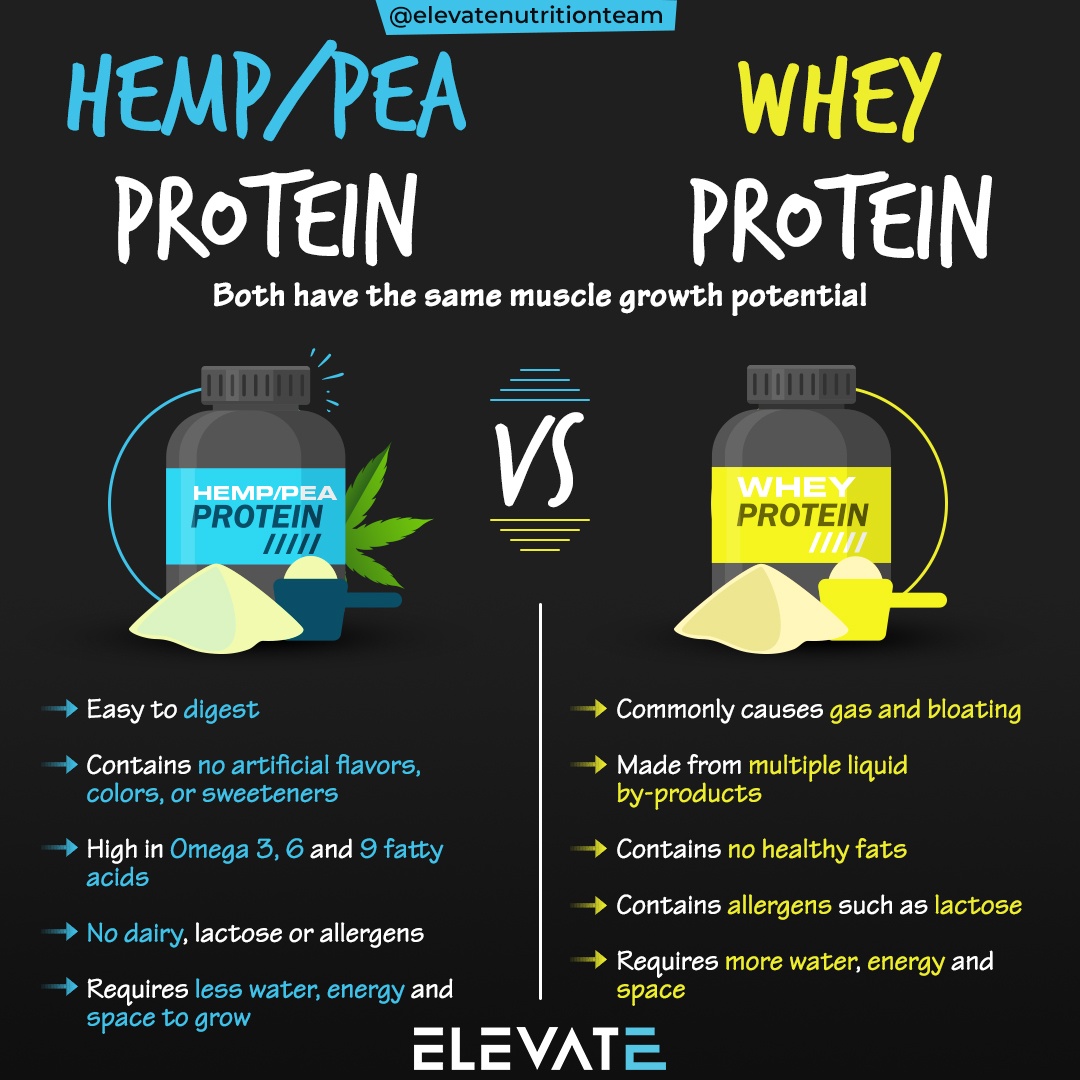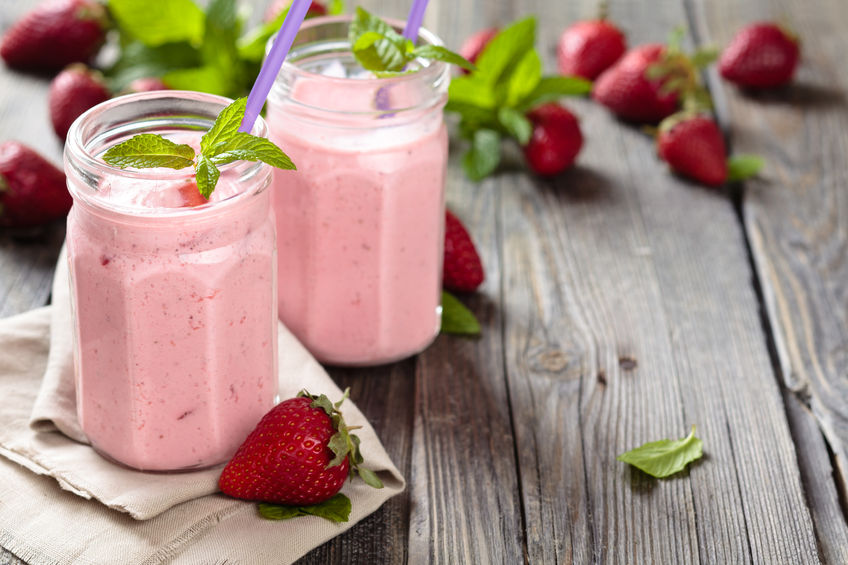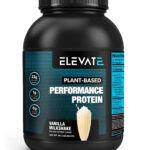Why Plant-Based Hemp & Pea Protein Is Better Than Whey Protein
Everybody knows that proteins are the building blocks of muscles and our bodies require much larger amounts of this macronutrient than vitamins, minerals, carbohydrates, and fats. Although we can get protein from meat, eggs, dairy, fish, and plants, it may not be enough to meet our daily nutritional needs, particularly if you are an athlete or participate in high-intensity workouts.
Hence, the high demand for protein supplements, especially among fitness-enthusiasts and anyone who wants to stay healthy and maintain an optimal body weight in this fitness-conscious world.
Plant-Based Protein vs. Whey Protein
If you go to a supermarket, you will find a seemingly infinite range of protein powders on display. You need to find the best source of protein for yourself and with so much information out there, it can be difficult to do so.
Whey protein is perhaps the most popular type of protein supplement found in the market. However, there is a much better choice for you in the form of plant-based pea and hemp protein. The latter is a perfect protein supplement for people who are looking to live a clean and cruelty-free lifestyle.
Are Pea and Hemp Protein Powders Complete Protein?
The human body requires 20 amino acids and nine of these are essential. Any food that contains all nine of these essential amino acids is a whole or complete protein.
It is true that animal-based sources are whole sources of protein. But the good news is that you can get complete protein sources from plants too, like hemp. Unlike most plant sources, hemp contains all 9 essential amino acids and is a complete protein source. On the other hand, pea protein is also an excellent protein source since it contains the complete range of essential amino acids, except for methionine, which you can easily get from other plant-based food sources as well.
Hence, like whey protein, both hemp and pea protein are excellent ways to bulk up your muscles.
Benefits of Hemp and Pea Protein
Hemp and pea protein offer a wide range of benefits over whey protein. The major ones are given below:
Easy to Digest: In contrast to dairy and whey protein, 91% to 98% of hemp protein is easily digestible. The same is the case with pea protein, which is well-tolerated by the body. They also include a high percentage of fiber, which is beneficial for healthier gut bacteria, reduced blood sugar and better digestion. It also helps you lose weight and keep it off.
Less than 5% of American adults fulfill their fiber recommendations; however, food like hemp protein can close this gap.
Additionally, plant-based protein is highly absorbable and creates an anabolic environment in your body that results in quicker healing from training and optimal muscle recovery.
Contain no Artificial Flavors, Colors, and Sweeteners: Unlike whey protein that requires quite a lot of processing, hemp and pea powders undergo minimal processing.
Hemp protein powder is brown-green in color and has a nutty, earthy taste. Because of this, it is suitable for smoothies and shakes.
Pea protein, on the other hand, is extracted from yellow peas, which are dried and grounded into a fine powder. This powder is removed from starch and is pale beige in color.
Due to the minimal processing, pea powder retains its natural vitamins, minerals and other elements, like iron.
High in Omega 3, 6 and 9 Fatty Acids: Hemp protein powder is made from hemp seeds that still contain 105 of their original fat content. These seeds contain an ideal ratio of 1:3 omega 3 to omega 6 fatty acids, which is very beneficial for heart health.
Peas, on the other hand, have low fat content, but what fat they have is mostly healthy. Because of their minimal processing, pea protein retains these healthy fats.
No Dairy, Lactose, and Allergens: When it comes to digestion, plant-based protein does not have any allergens that are commonly found in whey or animal-based protein. In particular, hemp is especially easy to digest because of the presence of edestin and albumin, which are quickly broken down by the human body.
This means that with plant-based proteins, your body can use almost all the amino acids required for muscle maintenance recovery and repair.
Nutrition-dense: Plant-based protein not just contains essential amino acids, but it also contains essential nutrients like iron, selenium, zinc, B vitamins, calcium and iodine as well as fiber. That’s because they naturally take in these minerals from the soil.
So you get all the benefits of protein, plus so much more from plant-based protein powders.
What are Some Concerning Things About Whey Protein?
There is no doubt that whey protein is a good source of protein. However, it comes with a few cons:
Commonly Cause Gas and Bloating: As people grow up, they develop milk allergies and lactose intolerance. The severity of milk allergies varies from person to person but most people complain of symptoms like bloating, gas, indigestion, stomach cramps, and diarrhea.
Since whey protein is a by-product of milk, people who are lactose intolerant cannot consume it.
Made From Multiple Liquid By-Products: Whey-protein is the liquid by-product that occurs when making cheese. Cow’s milk is made of 80% whey and 20% casein and whey was traditionally considered a waste product.
Nowadays, however, this by-product is used to make whey protein powder. Enzymes are introduced to the liquid to separate the whey and casein and it is removed of carbohydrates and fats. After undergoing a long process, the liquid is dried into powder form and sold as whey protein.
Contains Artificial Flavoring
Whey protein does not have a very pleasant taste and it is strong enough that it can ruin the flavor of other drinks and food. Because of this, companies add artificial flavoring to make it more palatable.
These flavorings are usually not derived from natural food but are synthetic, so if you are on a diet for organic, minimally-processed food, you can cross whey protein powder off your list.
Contains no Healthy Fats
Since the process of making whey protein powder requires stripping the whey of its fat content, the final product does not contain a lot of fat — healthy or otherwise. Due to this reason, it is less heart-healthy than protein powder made from hemp or other plant-based food.
Contains Allergens, Such as Lactose: If you are lactose-sensitive or lactose-intolerant, you may suffer from a few health issues, including flatulence and terrible stomach cramps. These are all signs of poor lactose absorption and you will be literally flushing your expensive whey protein down the toilet.
Besides these issues, whey protein powder can result in the outbreak of your skin. It also results in a large release of insulin immediately after consumption, which can lead to insulin resistance in the long run.
Bottom Line
Even though whey protein powder has muscle building properties, it has just as many cons as well, which can be a cause for concern for people. On the other hand, plant-based hemp and pea protein do not have many side effects at all. Plus, they are more than rich sources of essential amino acids — they also offer healthy fats, vitamins, and minerals, which are beneficial for our health.
Thanks to its digestibility, low levels of processing and additives, and high nutritional value, plant-based protein powder is the perfect supplement for your muscle-building needs.







